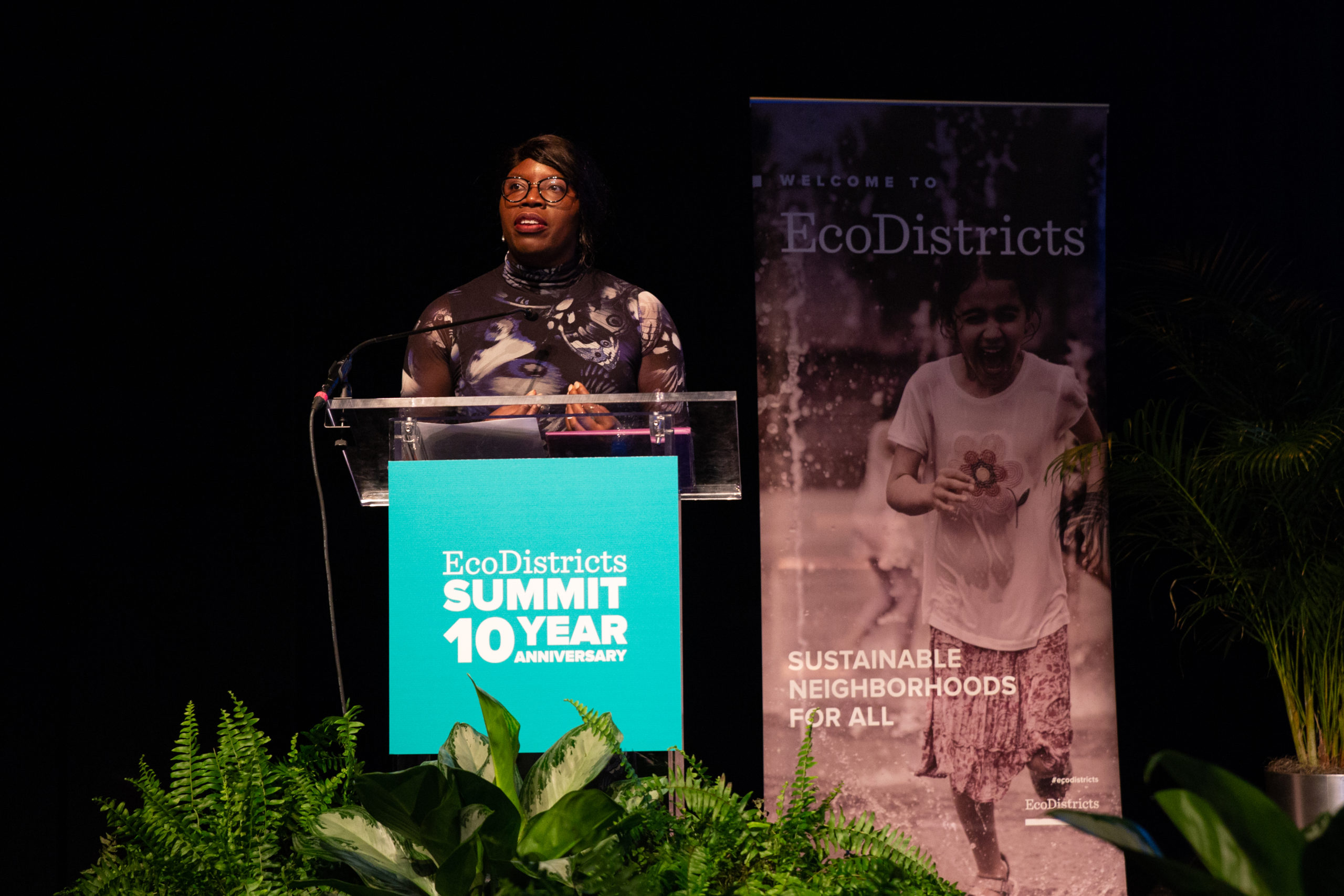Frank talk. Liz Ogbu of Studio O in Oakland and Kofi Boone, professor of landscape architecture at North Carolina State University, keynoted the 2019 EcoDistricts Summit with a very clear message to the 300 urban sustainability leaders assembled at the August Wilson Center in downtown Pittsburgh Nov. 5: racial equity needs to be at the heart of every design decision. Both Liz and Kofi mesmerized the room as storytellers – mixing history, humor, solutions and a candid assessment of traditional design processes that do more harm than good.
Liz kicked off the conference by setting a tone and framework for action that resonated throughout the event – a clarion call for empathy and reimagining how we work through a lens of shifting power dynamics, healing, deep listening, and “dreaming whole.” In her call for designers to do rootwork in healing and caretaking with disinvested communities, Ogbu expressed a vision of coming as people to the work – “dreaming whole,” not just “dreaming big.”
Says Ogbu, “When people feel stuck and are feeling pain from generations of neglect, it’s not enough to have good intentions. Power needs to be shared to make space for people to share their stories. If we start with incomplete stories – when we don’t do the work of reaching community voices – no one can find complete solutions. The complete stories and solutions come from the community’s lived experiences.”
Liz explored the underlying issues that lead to inequitable design, including the power dynamics inherent in architecture. To help make her point clear, she shared a comic book created by the Equity Collective that she is part of that humorously showed the dos and don’ts of community engagement with two characters – Dick and Rick. http://welcometocup.org/file_columns/0000/0789/dick_rick.pdf. Spoiler alert – don’t be a dick.
In summary, she asked the audience to consider combining the acts of being an intentional accomplice and designing a whole in order to get to the spatially equitable design of the place.
While Liz poetically shaped our thinking about sharing power and designing whole to encourage healing, Kofi powerfully framed the racial history ingrained in public space design. He helped to simultaneously inspire action and offered self-reflection on the role that we all play in activating or hindering the “Just Green” agenda. He laid out the long and persistent history of spatial injustice and the inspired work of African American advocates and practitioners to counter the explicit bias and racism displayed in the design of our landscapes and communities. Challenging the audience to link issues of social justice and the environmental movement, he emphasized that social cohesion requires awareness and a proactive understanding of social mobility, social capital, and social inclusion.
Through Frederick Law Olmsted’s story – the father of landscape architecture – Kofi pointed out the hazards of the benign approach Olmsted took despite his abolitionist beginnings when Central Park displaced a black community in favor of increasing land values. He cautions that these traditions were built on a foundation of royal gardens and are ingrained in our design DNA.
Kofi went on to highlight the role of many black designers that bravely challenged and influenced the industry over the generations, including Whitney Young, whose powerful 1968 speech at the national AIA conference spawned the National Organization of Minority Architects and the participatory design movement. Through his compelling weaving of stories, Kofi asks us to think about the decolonization of public space through a deeper understanding of our shared yet often untold history. Kofi closed the Summit by challenging each of us to tackle spatial racism in our work as community builders – and to do so with intention and rigor.


It was an honor to participate. And I want to applaud you all for hosting one of the most diverse gatherings on this topic I’ve been to. I especially appreciated the many leadership and content roles held by black and brown women. You don’t see that at other summits and conferences.